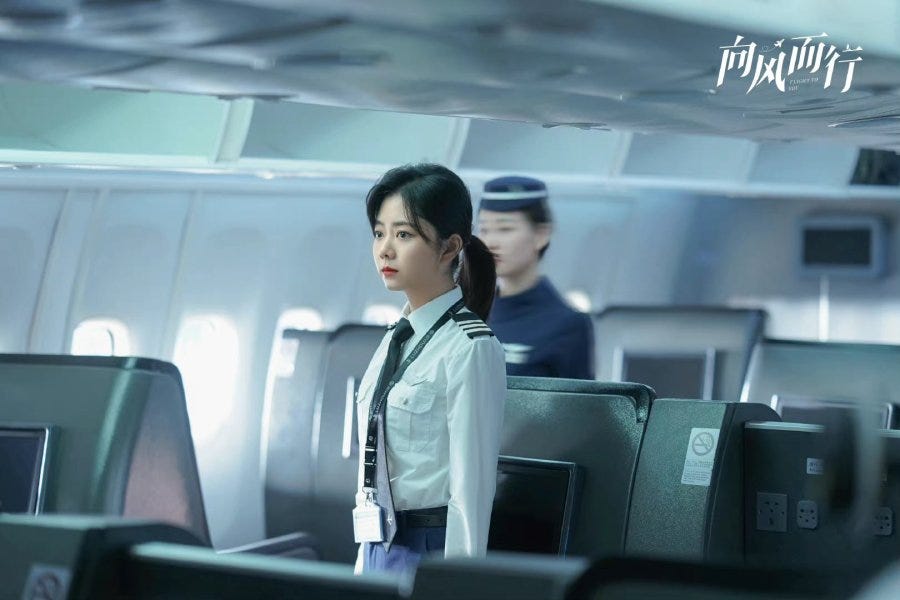Flight to You (2023) Episodes 21-30
Despite being heavy on the romance, I maintain that the best thing about this drama is the logistical aspects of aviation — the procedures, the decision making side of things even the political side of managing an airline. The romance, I imagine, is the sugar to make the medicine go down but it tends to be the most prosaic part of the show, made even more vapid by the love polygon that emerges to expedite matters. I know for a fact that people do find love in the workplace and that adulterous relationships formed in the workplace are often far more common than most of us think. On the back of all of that, we have a male lead who is dragging his feet despite being actively (and obviously) pursued by a subordinate-apprentice and a childhood friend. To compound things further, the woman that he actually likes has another admirer in the form of his best friend. The conclusion is clear. Gu Nanting might be a decisive dictator in the cockpit but concerning matters of the heart, he errs on being fainthearted. It’s hard for him to say “no” to one and “yes” to the other. I don’t know if such men exist in real life but he’s been saddled with a trauma — a deceased girlfriend who crashed her plane — as the rationale for unerring obsession with safety. As far as excuses go to fob off women, it’s not a bad one but it’s not the only excuse he has. It might not be a good look to be involved with an apprentice although no one has brought that up as an issue so far except his only rival, Ni Zhan, who has no reason to be generous.
To be fair, he does tell childhood friend Yuheng that he only sees her like a sister. She doesn’t quite believe him at first and she clings on to the belief that she can change his mind if she tries hard enough until one night when he walks right past her and goes straight to Cheng Xiao who seems to be in imminent danger from a lecher. A bolt of lightning from heaven strikes her sagaciously — she realises that changing the status quo for an unrequited love is not about doing due diligence. In fact diligence is no guarantee of anything where the messy business of love is concerned.
While many are barracking and have barracked for the romance between the leads, I can’t say I’m enthusiastic. Oddly enough. It’s not the lack of chemistry but the kind of chemistry that’s projected that sticks my craw. They start off as mentor and apprentice which is where these stories begin but the push and pull at this point in the narrative seems unconvincing. I’m not sure at this point if it’s just the way Wang Kai plays Gu Nanting — his reluctance to admit having deeper feelings — that’s having a contrary effect on me. He insists that theirs is a student-teacher relationship only and I’m inclined to believe him on some level except that it’s clear that he is bothered by the competition. All his actions could be interpreted as such. This is the trouble with the indecisive male lead who isn’t indecisive about much else in his life. It’s rather different to his mentor-apprentice dynamic in When A Snail Falls in Love. There are subtle shifts in the their relationship in that show which charts the progression. Conscious and unconscious. It’s clearly a meeting of true minds that gradually leads to a greater desire for intimacy. There’s more consistency with Ji Bai who is decisive in all things — who knows what’s right, what he wants and goes for it. The fact that he’s on a mission, and the fact that he almost lost his best friend doesn’t seem to have traumatized him to the point that he will deny himself a chance at love. In fact it might just provide him with just enough urgency to propel forward.
The result of all this is that the elaborate romantic polygon of Flight to You ends up being about forcing the hand of the male lead who is dithering despite all the nagging from the adults in his life. Even Cheng Xiao is nagging him to act on his feelings because let’s face it, even Blind Betty can tell that he’s doing a wretched job of lying about his feelings for Cheng Xiao. The truth is Ni Zhan who is not a bad sort and is generous with his wallet is not really much of competition. Cheng Xiao might pal around with him but she knows exactly what she wants. All three people do. But Ni Zhan is an excuse for Gu Nanting to postpone his decision. To test the waters. And to convince him that it’s The Real Deal.
One of the most contrived part of this series sees the core characters plus one on a mission of mercy in the aftermath of a disaster. The contrivance is not in the fact that they all happen to volunteer for relief work out in the remote mountain area handing out supplies to trapped/unevacuated villagers or even that untrained civilians are sent to a potentially dangerous area to deliver aid. What’s odd is the lack of emergency rescue workers in this situation. That a pregnant woman and a handful of children are left to their own devices without the oversight provided by rescue workers professional or volunteers is baffling. I’ve seen You’re My Hero. The set-up broke immersion for me. There’s little doubt that it was included to not only facilitate bonding but really the entire exercise is to facilitate the love triangle. How do we get Ni Zhan, Nanting and Cheng Xiao all in one place rubbing shoulders and spending a night together to intensify? It’s not a terrible idea but definitely lacks finesse. The entire sequence scene feels cliched, preachy, inauthentic and schmaltzy. It’s not the only one that made me cringe but it exemplifies a flaw in an otherwise slick production.
Indeed there are at least two other moments that I can recall where Gu Nanting is stuck in a holding pattern of dashing to Cheng Xiao’s rescue in intrusive fashion. He’s an uninvited guest but he comes running because the audience has to be thoroughly convinced that he is in love with her despite behaving like a pigheaded numpty. It’s supposed to be funny I’m guessing but it could also come across as being disingenuous, cowardly and double-minded. That said, I like Nanting too much to think that he’s trying to have his cake and eat it too.
What’s rather more interesting is the quandary that comes up when most of the same lot of people find themselves on a plane from Luzhou to Singapore for some big corporate ceremony along with paying customers. First it’s the weather that plays havoc so they divert to Guangzhou. As a result they fall behind schedule. Then a passenger collapses in the little boy’s room and the captain, Jiang Tao, has to decide if he should divert to Saigon or go straight to Singapore where he insists that medical treatment would be better. These sorts of conflicts potentially elevate the material if well-conceived and executed. On some level it is obvious what the “right” answer is — it’s the one that the leads and the audience sensibly agree on. Without any question I would have had the plane diverted to Saigon because the ailing passenger was presenting serious symptoms like chest pains. However, the show is adamant to make Jiang Tao the villain despite the fact that he is generally cautious to a fault and competent even if he’s something of a bootlicker. Obviously the show wants to give him the boot and show him the door at some point so they’ve set this up to ensure that he not only misses out on the big promotion (for which Nanting and Ni Zhan are fellow contenders) but becomes a threat eliminated. Jiang Tao is constructed first and foremost as the enemy of progress. In this fairytale he is the two-faced dragon that has to be slain because he stands in the way of a progressive utopia. He is an obstacle to a prospective happily-ever-after that must be removed.
I don’t think anyone with half a brain would disagree that a good captain is much more than a competent pilot. Leadership is much more than skill and delegation. Character has to feature somewhere in this and out of that good judgment. Jiang Tao disqualifies himself in the leadership stakes because the implication here is that he puts his own ambition ahead of the greater good. Ironically, he makes the decision to chug on ahead to Singapore with sick passenger in tow because he in large part believes that he is pursuing the greater good — grumpy passengers complaining about falling behind schedule, a corporate event for the company that they would be late for and a promotion in the offing for oneself.
I can hear Spock telling Kirk from Star Trek fame, the immensely quotable line “The needs of the many outweigh the needs of the one.” Only to have Kirk flip it on its head with “the needs of the one outweigh the needs of the many.”





